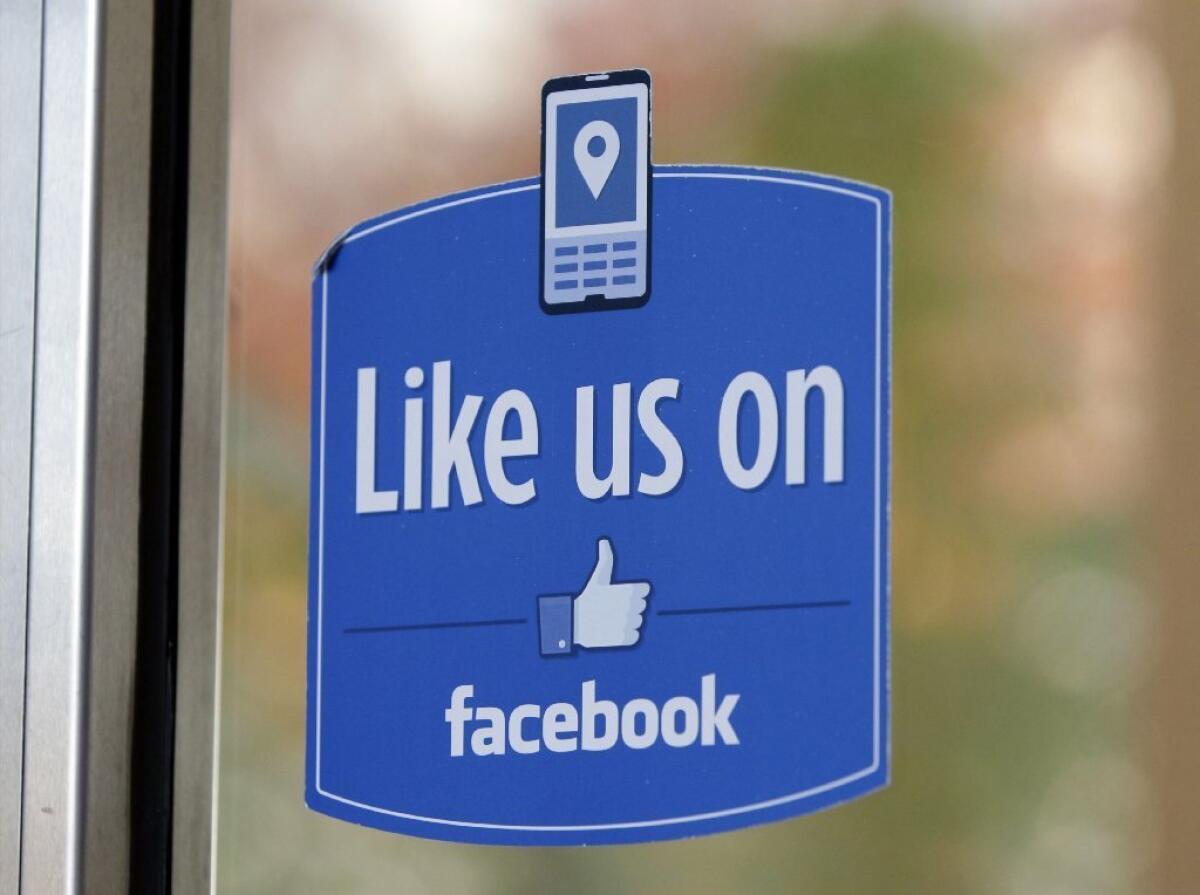Facebook social ads settlement under fire from children’s advocates

- Share via
SAN FRANCISCO -- Children’s advocates are challenging a settlement in a class-action lawsuit in an effort to require Facebook to get explicit permission from parents before using the personal information — as well as the images, likes and comments — of teens in advertising on the giant social network.
The advocates want the U.S. 9th Circuit Court of Appeals to vacate the Facebook settlement. They say the settlement violates the law in seven states including California that require parents’ permission before a child’s image can be used in advertising.
Facebook says that by using the service, users consent to this form of advertising called “social ads.”
Adults cannot opt out of some of the ads. To opt out of other ads, they have to navigate complex privacy settings.
Under the settlement, if a user age 13 to 18 is friends with his or her parents on Facebook, then Facebook would provide a control for parents to opt teens out of “sponsored stories.”
If a teen indicates that his or her parents are not on Facebook, then Facebook would opt teens out of “sponsored stories.”
Advocates are pushing for Facebook to let kids opt out of social ads until they are 18.
It’s a big headache for Facebook, which said last month that it would stop using the type of ad that gave rise to the lawsuit. But Facebook will continue to sell other ads that feature users’ likes and comments.
The nonprofit group Public Citizen is leading the charge to get Facebook to change its practices when it comes to teens. It has filed an appeal on behalf of five parents and their kids who use Facebook. The group says the burden should be on Facebook to get the parents’ permission to use teens’ personal information.
“With this settlement Facebook hopes to continue getting advertiser ‘likes’ by selling off its hottest commodity: the personal information of teenagers,” said Hudson Kingston, legal counsel for the Center for Digital Democracy which has joined with Public Citizen. “This leaves teens open to all sorts of privacy violations when they show up in endorsements they never agreed to, and this reckless attitude toward their privacy in order to boost ad revenue shows who Facebook considers its real friends to be.”
One child advocacy group that initially supported the $20-million settlement –- and stood to benefit from it financially -- has now told the appeals court that it no longer wants any part of it.
The Campaign for a Commercial-Free Childhood (CCFC) was supposed to receive $290,000 under the settlement. It’s one of the nonprofit groups as well as universities sharing in about $4.8 million. The sum represented about 90% of the CCFC’s annual budget last year.
“To put it in perspective, we’ve never received more than $100,000 from a donor or foundation at any given time in our history,” said Josh Golin, associate director of the nonprofit, known for forcing Walt Disney Co. to offer refunds to people who bought Baby Einstein videos on the company’s claims that it boosted babies’ intelligence.
But, Golin said, “after reading objections to the settlement from other nonprofits whose work we respect, we consulted with independent outside counsel to get an objective opinion about its terms. We understood from the beginning that any settlement is a compromise, but we have now come to the conclusion that this one is so flawed that it is a violation of CCFC’s mission to protect children from harmful commercialism. Specifically, this settlement is bad for children because it provides a release of liability without forcing Facebook to make any real changes that would protect children from the commercial use of their names and images.”
Facebook points out that a federal court approved the settlement after a lengthy hearing which considered these grounds.
“The court-approved settlement provides substantial benefits to everyone on Facebook, including teens and their parents, and goes beyond what any other company has done to provide consumers visibility into and control over their information in advertising,” Facebook spokeswoman Jodi Seth said in an email. “The same arguments on state law were raised and rejected by the court last year, and a dozen respected groups continue to support the settlement.”
Facebook users filed the original lawsuit alleging that social ads violate California law because they publicize products or services that users “like” without paying those users or giving them a way to opt out. The settlement of the lawsuit was supposed to make sure that users gave clear consent to having their comments, images and likes being used in ads.
Privacy advocates have railed against the terms of the settlement. Now they are taking on one aspect of the settlement: how it affects teens.
One of the parents objecting to settlement, Brooklyn mom Margaret Becker said she was unaware of the practice until she saw news about the settlement.
So she asked her daughter if she had seen her image in a sponsored ad. Her daughter said she had seen her image in an ad for a band she had liked on a friend’s Facebook page when she was 15 years old.
“At the time her only thought was, that was strange,” Becker said. But after discussing the situation, the implications dawned on her, Becker said.
“I don’t have a problem with her mentioning to friends that she likes a band,” Becker said. “But that’s really different from then her being in an advertisement for that band.”
“I think it’s upsetting,” she said.
ALSO:
Facebook loosens privacy policy on teens’ posts
Like it? Social ads turn users into unwitting endorsers
Facebook removes controversial line about teens in privacy policy






